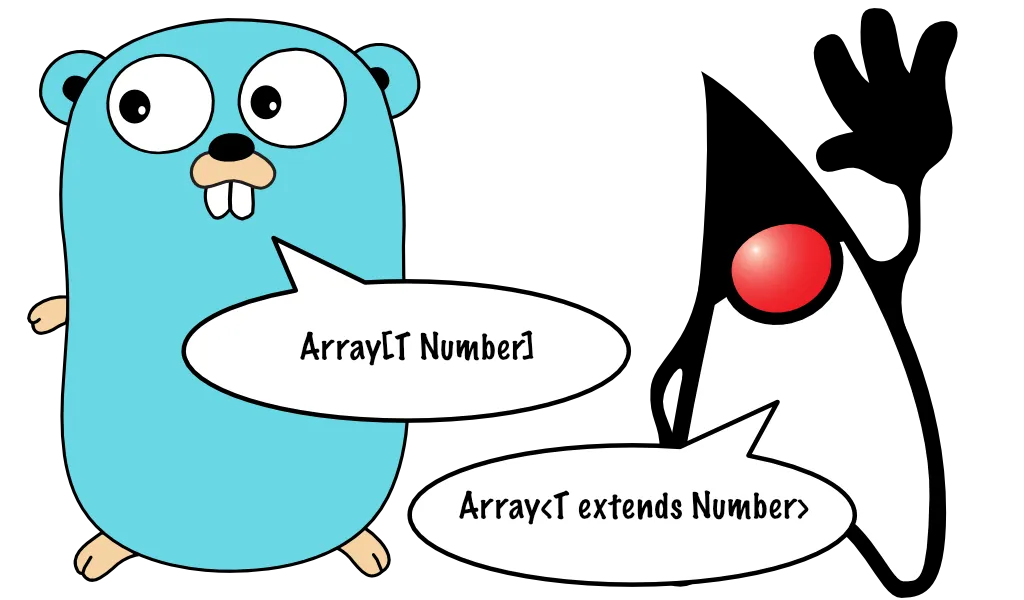代码生成
Go 的代码生成主要用来解决泛型编程的问题
泛型编程:类型与算法解耦
类型检查
Go 在支持泛型之前,只能用 interface{},必然涉及到类型检查
Type Assertion 1 2 3 4 5 6 7 8 9 10 11 12 13 14 15 16 17 18 19 20 21 22 23 type Container []interface {}func (c *Container) interface {}) { *c = append (*c, elem) } func (c *Container) interface {} { elem := (*c)[0 ] *c = (*c)[1 :] return elem } func main () c := &Container{} c.Put(1 ) c.Put("hello" ) elem, ok := c.Get().(int ) if !ok { panic ("assertion error" ) } fmt.Printf("elem = %d\n" , elem) }
Reflection 1 2 3 4 5 6 7 8 9 10 11 12 13 14 15 16 17 18 19 20 21 22 23 24 25 26 27 28 29 30 31 32 33 34 35 36 37 38 39 40 41 42 43 44 45 46 47 48 49 50 51 type Container struct { sl reflect.Value } func NewContainer (t reflect.Type, size int ) if size <= 0 { size = 1 << 8 } return &Container{ sl: reflect.MakeSlice(reflect.SliceOf(t), 0 , size), } } func (c *Container) interface {}) error { if reflect.ValueOf(val).Type() != c.sl.Type().Elem() { return fmt.Errorf("cannot put a %T into a slice of %sl" , val, c.sl.Type().Elem()) } c.sl = reflect.Append(c.sl, reflect.ValueOf(val)) return nil } func (c *Container) interface {}) error { if reflect.ValueOf(refVal).Kind() != reflect.Ptr || reflect.ValueOf(refVal).Elem().Type() != c.sl.Type().Elem() { return fmt.Errorf("needs *%sl but got %T" , c.sl.Type().Elem(), refVal) } reflect.ValueOf(refVal).Elem().Set(c.sl.Index(0 )) c.sl = c.sl.Slice(1 , c.sl.Len()) return nil } func main () f1 := 3.1415926 f2 := 1.41421356237 c := NewContainer(reflect.TypeOf(f1), 1 <<4 ) if err := c.Put(f1); err != nil { panic (err) } if err := c.Put(f2); err != nil { panic (err) } g := 0.0 if err := c.Get(&g); err != nil { panic (err) } fmt.Printf("%v (%T)\n" , g, g) fmt.Println(c.sl.Index(0 )) }
C++ Template
模板具体化:在编译期间,根据不同的变量类型来自动化生成相关类型的函数或者类
1 2 3 4 5 6 7 8 9 10 11 12 13 14 15 16 17 18 19 20 21 #include <iostream> using namespace std;template <class T>T GetMax (T a, T b) { T result; result = (a > b) ? a : b; return result; } int main () int i = 5 , j = 6 , k; k = GetMax <int >(i, j); cout << k << endl; long l = 10 , m = 5 , n; n = GetMax <long >(l, m); cout << n << endl; }
Go Generator
在 Go 1.18 支持泛型之前,编译器本身不会做类似 C++ 模板具体化的动作
1 2 3 4 5 6 7 8 $ tree . ├── gen.go ├── gen.sh ├── go.mod ├── go.sum └── template └── container.tmp.go
函数模板
设置好相应的占位符
template/container.tmp.go 1 2 3 4 5 6 7 8 9 10 11 12 13 14 15 16 17 package PACKAGE_NAMEtype GENERIC_NAMEContainer struct { s []GENERIC_TYPE } func NewGENERIC_NAMEContainer () return &GENERIC_NAMEContainer{s: []GENERIC_TYPE{}} } func (c *GENERIC_NAMEContainer) c.s = append (c.s, val) } func (c *GENERIC_NAMEContainer) r := c.s[0 ] c.s = c.s[1 :] return r }
脚本
按规则替换文本并生成新代码
gen.sh 1 2 3 4 5 6 7 8 9 10 11 12 13 14 15 16 #!/bin/bash set -eSRC_FILE=${1} PACKAGE=${2} TYPE=${3} DES=${4} PREFIX="$(tr '[:lower:]' '[:upper:]' <<< ${TYPE:0:1}) ${TYPE:1} " DES_FILE=$(echo ${TYPE} | tr '[:upper:]' '[:lower:]' )_${DES} .go sed 's/PACKAGE_NAME/' "${PACKAGE} " '/g' ${SRC_FILE} | \ sed 's/GENERIC_TYPE/' "${TYPE} " '/g' | \ sed 's/GENERIC_NAME/' "${PREFIX} " '/g' > ${DES_FILE}
注释代码 gen.go 1 2 3 4 5 6 7 8 9 10 11 12 13 14 15 16 17 18 19 20 21 package genimport "fmt" func generateUint32Example () var u uint32 = 42 c := NewUint32Container() c.Put(u) v := c.Get() fmt.Printf("generateExample: %d (%T)\n" , v, v) } func generateStringExample () var s string = "Hello" c := NewStringContainer() c.Put(s) v := c.Get() fmt.Printf("generateExample: %s (%T)\n" , v, v) }
1 2 3 4 5 6 7 8 9 10 11 12 13 14 $ go generate $ tree . ├── gen.go ├── gen.sh ├── go.mod ├── go.sum ├── string_container.go ├── template │ └── container.tmp.go └── uint32_container.go $ go build











